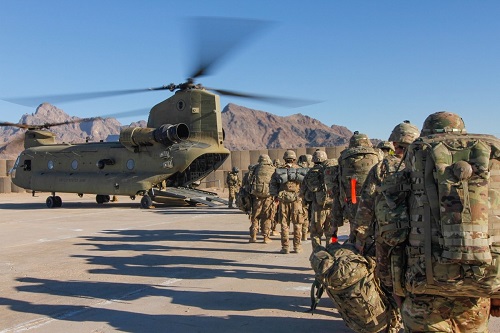USArmy photo
By
Ruslan Mamedov
U.S. senators Republican Rand Paul and Democrat Tom Udall proposed to Congress the draft American Forces Going Home After Noble Service Act (AFGHAN, 2019). In fact, this step allowed lawmakers to start the process of securing a legal base in the Congress for the U.S. President Donald Trump’s decision on the almost halved (from 14 000 persons) reduction of military presence in Afghanistan.
The project includes the declaration of the U.S. mission victory in Afghanistan. The law will also oblige the Pentagon and the President to prepare within 45 days a plan for the American force withdrawal from Afghanistan, which must be completed in a year. In addition, about 3 million soldiers, veterans of the war in Afghanistan will receive an allowance from the federal government in the amount of 2.5 thousand dollars. ($7.5 billion in total).
The adoption of the law by Congress is questionable, but it could be supported by both Republicans and Democrats.
One of the most popular members of Congress Democrat Alexandria Ocasio-Cortez expressed her opinion about the Iraqi campaign relating to the use of American armed forces abroad: “all of Congress was wrong <…>, and led my generation into a disastrous and wrong war that all would come to regret”. She considers that the U.S. should not have been present in Afghanistan either.
From open sources, the outline of the American plan for the withdrawal of its forces from Afghanistan becomes clear. However, the negotiating process between the political wing of the Taliban in Doha and the U.S. special representative for Afghanistan Zalmay Khalilzad demonstrates that the Afghan issue is still far from being resolved.
Three issues are important for the Americans in negotiations with the Taliban: the statement of the Taliban on a complete cessation of hostilities; the initiation of negotiations between the Taliban and Afghanistan’s government; and preventing the growth of terrorist groups such as ISIS or al-Qaeda.
This would enable the U.S. to embark on an immediate withdrawal of their troops.
Nevertheless, the Taliban have its own requirements. If it stands the same position with the United States on the issue of fighting against radicals from the ISIS, then the possibility of negotiations with the government (which the Taliban consider as a puppet of Washington) stumbles upon many problems requiring detailed examination. Thus, the Taliban are not ready to engage in dialogue with the Afghan government before the withdrawal of foreign forces from the country. Moreover, the very fact of negotiations with the government inevitably raises the question of the Taliban integration into the political process. How is this going to happen? If it comes to ministerial posts, then it’s highly unlikely that the government is ready to share it with the Taliban.
It is obvious that with the withdrawal of American troops, the armed forces of Afghanistan trained by them will not be able to effectively resist the Taliban.
If the negotiations between the Afghan government and the Taliban fail (if they ever begin), hostilities will resume. It will occur especially if the US does not back the Afghan security forces.
Americans still remember that after the Soviet’s withdrawal from Afghanistan, the Soviet allies in Kabul held their power as long as funding came from Moscow. History could repeat itself.
Now there are discussions of alternative ways out of the situation. It seems that part of the U.S. security funding in Afghanistan can already go to the activities of the U.S. private military companies in the country, including the structures of Eric Prince. The United States President’s national security adviser, John Bolton, is also open to such an approach.
The international dimension of the conflict
In the context of ongoing negotiations between the Taliban and the United States, the vigilance of all parties involved in the Afghan conflict is growing. The attitude to the situation of Russia and China is particularly important. In a climate of the armed conflict between India and Pakistan, the effectiveness of the SCO is questioned. China remains committed to providing resources for the state reconstruction, as it was agreed between all parties. At the same time, Beijing is not interested in creating of “safe haven” for terrorist groups in Afghanistan because of the Uighur issue.
For Russia, the problems of countering international terrorism and controlling drug trafficking are traditionally important.
The abrupt withdrawal of American forces from Afghanistan could destabilize the situation, leading to the failure of any peace initiatives, a new round of war between intra-Afghan forces and, ultimately, the transition of Kabul under the control of radicals.
Such a scenario could lead to the further radicalization of the situation and entail the moving of the crisis zone beyond the political and geographical borders of Afghanistan. This makes the Central Asian States vulnerable. For this reason, Russia continues to strengthen its cooperation with the Central Asian region countries. Russian military presence in Tajikistan is ongoing, and joint exercises are constantly carried out. While the refinement of actions was needed in order to counter regional security challenges, joint exercises have been conducted by Tajikistan and Uzbekistan since 2018. In addition, Tajikistan will hold joint exercises with the CSTO peacekeeping forces “Unbreakable brotherhood-2019”.
Though Moscow has intercepted the American negotiating agenda, it wasn’t repeated. According to the special representative of Russian President for Afghanistan Zamir Kabulov, the “Moscow format” is about national reconciliation within Afghanistan, while the negotiations between the Americans and the Taliban are about the further presence or withdrawal of foreign troops.
Thus, both the U.S., represented by Zalmay Khalilzad and Russia by Zamir Kabulov as well as the results of the Moscow talks in a gentleman’s way declared the usefulness of both initiatives. However, the matter of whether Afghanistan will become a point of joint and coordinated actions of the United States and Russia remains open.
Most likely a constructive dialogue between Moscow and Washington will not be formed because of many regional issues: American-Iranian relations, the Pakistani-Indian conflict, the actual intra-Afghan confrontation and the dynamics of Russian-American relations.
Especially considering that the Americans are not afraid of harsh measures if something runs counter to a given direction. It was clearly demonstrated by the example of the former national security adviser Mohammad Hanif Atmar’s removal in 2018. Now he is the candidate for President of Afghanistan.
The chances of incumbent President Ashraf Ghani, who is dissatisfied with the negotiations without the participation of the Central government both in Doha and in Moscow, to be properly prepared to the July 2019 elections are decreasing. It is for the elections that the Americans seek to reach an agreement with the Taliban. At the same time, the political forces in Kabul continue to be divided largely due to the events of 2018, associated with the fact that Ashraf Ghani removed the part of the military and political elite from administrative resources. It also does not make the political process certain.
In these circumstances, the United Stated offers other forces to take responsibility for the situation in Afghanistan.
If the U.S. really starts the withdrawal, risks of destabilization of the region are inevitable. In this sense, many regional and extra-regional players will have to deal with them without the U.S. The best scenario would be a prepared, planned and coordinated withdrawal of the U.S. forces, as well as continued funding of Afghan forces.
This article was originally published by the RIAC and is reproduced with their kind permission
Ruslan Mamedov
MSc in International Relations, Program Coordinator (MENA) at the Russian International Affairs Council.



No Comments Yet!
You can be first to comment this post!